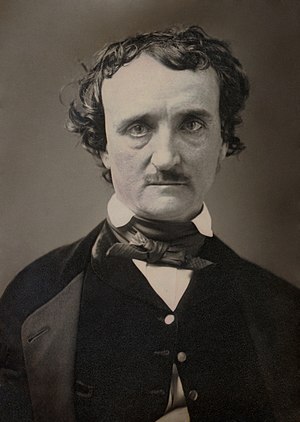Edgar Allan Poe

1849 "Annie" daguerreotype of Poe
Born: Edgar Poe, January 19, 1809; Boston, Massachusetts, U.S.
Died: October 7, 1849 (aged 40); Baltimore, Maryland, U.S.
Alma mater: University of Virginia, United States Military Academy
Spouse: Virginia Eliza Clemm Poe
(m. 1836; d. 1847)
Edgar Allan Poe (/poʊ/; born Edgar Poe; January 19, 1809 – October 7, 1849) was an American writer, editor, and literary critic. Poe is best known for his poetry and short stories, particularly his tales of mystery and the macabre. He is widely regarded as a central figure of Romanticism in the United States and of American literature as a whole, and he was one of the country's earliest practitioners of the short story. He is generally considered the inventor of the detective fiction genre and is further credited with contributing to the emerging genre of science fiction. He was the first well-known American writer to earn a living through writing alone, resulting in a financially difficult life and career.
{snip}
Death

Edgar Allan Poe is buried at
Westminster Hall in Baltimore, Maryland (Lat: 39.29027; Long: −76.62333). The circumstances and cause of his death remain uncertain.
Main article: Death of Edgar Allan Poe
On October 3, 1849, Poe was found delirious on the streets of Baltimore, "in great distress, and… in need of immediate assistance", according to Joseph W. Walker who found him. He was taken to the Washington Medical College where he died on Sunday, October 7, 1849 at 5:00 in the morning. He was not coherent long enough to explain how he came to be in his dire condition and, oddly, was wearing clothes that were not his own. He is said to have repeatedly called out the name "Reynolds" on the night before his death, though it is unclear to whom he was referring. Some sources say that Poe's final words were "Lord help my poor soul". All medical records have been lost, including his death certificate.
Newspapers at the time reported Poe's death as "congestion of the brain" or "cerebral inflammation", common euphemisms for death from disreputable causes such as alcoholism. The actual cause of death remains a mystery.[75] Speculation has included delirium tremens, heart disease, epilepsy, syphilis, meningeal inflammation, cholera, and rabies. One theory dating from 1872 suggests that cooping was the cause of Poe's death, a form of electoral fraud in which citizens were forced to vote for a particular candidate, sometimes leading to violence and even murder.
{snip}
In popular culture
{snip}
Poe Toaster
Main article: Poe Toaster
A bottle of cognac and three roses were left at Poe's original grave marker for decades every January 19 by an unknown visitor affectionately referred to as the "Poe Toaster". Sam Porpora was a historian at the Westminster Church in Baltimore where Poe is buried, and he claimed on August 15, 2007 that he had started the tradition in 1949. Porpora said that the tradition began in order to raise money and enhance the profile of the church. His story has not been confirmed, and some details which he gave to the press are factually inaccurate. The Poe Toaster's last appearance was on January 19, 2009, the day of Poe's bicentennial.
{snip}

